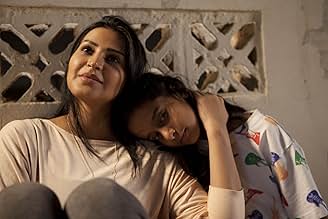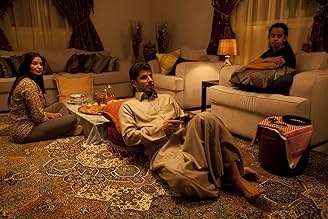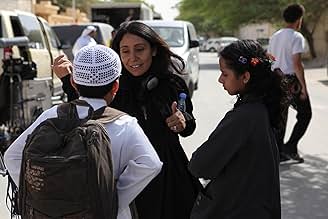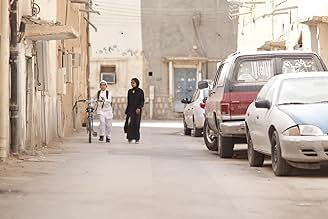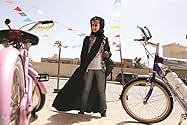Wadjda
- 2012
- Tous publics
- 1h 38m
IMDb RATING
7.5/10
22K
YOUR RATING
An enterprising Saudi girl signs on for her school's Koran recitation competition as a way to raise the remaining funds she needs in order to buy the green bicycle that has captured her inte... Read allAn enterprising Saudi girl signs on for her school's Koran recitation competition as a way to raise the remaining funds she needs in order to buy the green bicycle that has captured her interest.An enterprising Saudi girl signs on for her school's Koran recitation competition as a way to raise the remaining funds she needs in order to buy the green bicycle that has captured her interest.
- Director
- Writer
- Stars
- Nominated for 1 BAFTA Award
- 22 wins & 36 nominations total
Abdullrahman Al Gohani
- Abdullah
- (as Abdullrahman Algohani)
Sara Al Jaber
- Leila
- (as Sara Aljaber)
- Director
- Writer
- All cast & crew
- Production, box office & more at IMDbPro
Featured reviews
In a land where where cinemas are illegal, the first feature film shot entirely in Saudi Arabia by its first female director, 'Wadjda' is simple yet alluring neorealist film about a child and a bicycle. Haifaa Al-Mansour's brave effort gives us an interesting glimpse into the lives of women in a strict religious country like Saudi Arabia.
Being scolded for not wearing a head-scarf to school and for singing when her father's friends are in the other room (women unable to show themselves or their talents in presence of men), being sexually harassed by a building site worker, seeing her mother sad and angry because her dad is about to marry another woman (desperation for a male heir and the existence of polygamy), her mother almost losing her job because of her dependence on a rude driver (women are not allowed to drive any kind of transport), seeing one of her classmates getting married (rare but existent child marriages), seeing two elder schoolmates get wrongfully accused of immoral intimate conduct, and feeling disappointed after not seeing her name in the family tree (only male children are given importance); these are just few of the female struggles we see through the eyes of our young tomboy heroine, Wadjda. From the very first scene where she stands out in a group of singing school girls with her converse shoes, we see Wadjda as someone rebellious and strong. In a repressive land where women are oppressed, based on strict religious laws, not only by men but by other women as well, Wadjda dreams of having a green bicycle, so that she could overtake her annoying yet caring friend Abdullah. Though girls are not allowed to ride bikes, she starts collecting money by selling love-song mixed tapes and football club bracelets to her schoolmates. And thus begins her journey. Just like 'The Bicycle Thief', the bicycle here signifies freedom.
The young yet incredibly talented Waad Mohammed gives a charming performance, and carries the movie on her shoulders with terrific ease. Waad along with Haifaa (Director) are the two brave talents that emerge from this feature. All the supporting actors act commendably as well. International composer Max Richter's background score is subtle yet as captivating as the movie itself. Shot with such authentic beauty, there are many scenes which stay in your mind long after the movie is over, one of which is where the young friend Abdullah asks Wadjda, in an adorably sweet way, if she knows that he wants to marry her when they grow up; the scene has a lot of meaning and hope attached to it.
It's not just a critique on Saudi society, but it's a universal story which talks about a society's limitations and possibilities.
Being scolded for not wearing a head-scarf to school and for singing when her father's friends are in the other room (women unable to show themselves or their talents in presence of men), being sexually harassed by a building site worker, seeing her mother sad and angry because her dad is about to marry another woman (desperation for a male heir and the existence of polygamy), her mother almost losing her job because of her dependence on a rude driver (women are not allowed to drive any kind of transport), seeing one of her classmates getting married (rare but existent child marriages), seeing two elder schoolmates get wrongfully accused of immoral intimate conduct, and feeling disappointed after not seeing her name in the family tree (only male children are given importance); these are just few of the female struggles we see through the eyes of our young tomboy heroine, Wadjda. From the very first scene where she stands out in a group of singing school girls with her converse shoes, we see Wadjda as someone rebellious and strong. In a repressive land where women are oppressed, based on strict religious laws, not only by men but by other women as well, Wadjda dreams of having a green bicycle, so that she could overtake her annoying yet caring friend Abdullah. Though girls are not allowed to ride bikes, she starts collecting money by selling love-song mixed tapes and football club bracelets to her schoolmates. And thus begins her journey. Just like 'The Bicycle Thief', the bicycle here signifies freedom.
The young yet incredibly talented Waad Mohammed gives a charming performance, and carries the movie on her shoulders with terrific ease. Waad along with Haifaa (Director) are the two brave talents that emerge from this feature. All the supporting actors act commendably as well. International composer Max Richter's background score is subtle yet as captivating as the movie itself. Shot with such authentic beauty, there are many scenes which stay in your mind long after the movie is over, one of which is where the young friend Abdullah asks Wadjda, in an adorably sweet way, if she knows that he wants to marry her when they grow up; the scene has a lot of meaning and hope attached to it.
It's not just a critique on Saudi society, but it's a universal story which talks about a society's limitations and possibilities.
We went to see this as a family, with our two daughters, 14 and 16. We all enjoyed it. Seeing how the limitations placed on women in Saudi Arabia play out in everyday life was of great interest to all of us. The story line depicted not only Wadjda's efforts to break free from her circumscribed world, but also how adult women struggle to survive. The effort to simply support oneself without a man when one can't even drive or wear clothes that allow for mobility reflects how rules ostensibly meant to "protect" women keep them dependent on men for the most rudimentary basics.
I suspect that even this film does not depict the lives of women in Saudi Arabia completely accurately. Some concessions seem to have been made to the government. No religious police are to be seen, for example. Nonetheless, it is well worth seeing, and we applaud Haifaa al-Mansour for making it. We look forward to her future work.
I suspect that even this film does not depict the lives of women in Saudi Arabia completely accurately. Some concessions seem to have been made to the government. No religious police are to be seen, for example. Nonetheless, it is well worth seeing, and we applaud Haifaa al-Mansour for making it. We look forward to her future work.
WADJDA is a straightforward tale of a young girl Wadjda (Waad Mohammed) growing up in a suburb of Riyadh, Saudi Arabia, who wants to buy a bicycle. Unable to find the money to do so, she enters a competition to speak the Koran in public with a substantial cash prize. After considerable time spent studying the text, she wins the competition, but sadly doesn't receive the money. In the end, however, she achieves her dreams - but not in the way she expects. Haifaa Al-Mansour's film is noteworthy for being a woman's film directed by a woman; it shows in careful detail the ways in which women's lives are constructed in Saudi Arabia, as well as showing how influential the Koran is in determining people's behavior. Some viewers might think that the women's lives are unfairly restricted; the film suggests that this is what many women believe is the right thing to do. By doing so, WADJDA shows how different people embraces different concepts of Islam. On the other hand, the film also suggests that individuals - especially children - should have at least some means to express themselves, particularly when they have worked to hard to achieve their aims. To restrict them is also to repress them; and this ultimately leads them to accept subordination as a way of life. WADJDA proves that the opposite should be true; not only for Wadjda herself but also for her mother (Reem Abdullah).
10-year-old Wadjda lives in Saudi Arabia. She's a bit rebellious, which means she wears basket shoes in school, listens to Western rock at home and has befriended a boy her own age. But she mustn't sing too loud, because the men can hear her and get offended.
Wadjda wants to go further and have her own bicycle, which invites trouble in her country. The story is told in a very warm way and you learn one thing. People in cultures totally different from yours are very much like you.
Realism here. Everyday people having everyday problems, but not the problems you have. A humanistic film, which makes it concerning everybody.
Wadjda wants to go further and have her own bicycle, which invites trouble in her country. The story is told in a very warm way and you learn one thing. People in cultures totally different from yours are very much like you.
Realism here. Everyday people having everyday problems, but not the problems you have. A humanistic film, which makes it concerning everybody.
¨You won't be able to have children if you ride a bike.¨
Wadjda is a beautiful yet simple film about a young girl who is willing to break society's boundaries and traditions in order to achieve her goal. In a sense it plays out as a metaphor considering Wadjda is the first feature film from Saudi Arabia which happens to be directed by a female. In a culture where women aren't allowed to speak up to men or even to drive a vehicle, Haifaa Al-Mansour has found a way to share her voice with the world through cinema. That is groundbreaking on its own considering that Saudi Arabia doesn't even have a film industry and that women are very much tied up to the limitations that their society puts on them. Al- Mansour, who also wrote the screenplay, gets her message across in a simple manner without trying to be judgmental or harsh on her culture. It is through the eyes of this 10 year old girl that we see how difficult the culture is on women. Not being allowed to ride a bike for fear that she could lose her virtue and purity plays out as a metaphor as to the limitations females face in these countries. I'm pretty sure that we all agree with Al-Mansour's viewpoints here in the west, but it is a shame that this film won't be seen by the people who really should see this film, the Saudis. It may be a familiar tale to us (it has all the known elements of a classic underdog story), but it works thanks to a wonderful performance from the young Waad Mohammed who plays a character we all can identify and relate to. Wadjda is worth seeing for the historical significance it has for females in Islamic countries who are trying to get their voice heard.
Wadjda (Waad Mohammed) is a ten year old girl from Saudi Arabia who lives with her mother (Reem Abdullah) in Riyadh. She's from a very conservative society where women have to cover their hair around men, but she is a very lovable girl who's always pushing the boundaries to her limitations. When one of the boys (Abdullrahman Al Gohani) begins teasing her and outruns her on his bike, she promises that she will buy one to race him and beat him. She sees a beautiful green bike on sale and since her mother doesn't give her the money because she considers girls shouldn't ride bikes, Wadjda decides to raise the money herself. The perfect opportunity presents itself when director Ms. Hussa (Ahd) offers prize money for the winner of a Koran recitation competition at her school. Wadjda begins to dedicate her time and efforts to this competition, while her mother is worried about trying to convince her husband (Sultan Al Assaf) to stay with her and not get remarried. Wadjda is dedicated to achieving her goal despite the limitations presented by the people around her.
The young and talented Waad Mohammed stands out in this film with a heartfelt and lovable performance. It is a simple tale and one we've seen many times in the past with the exception that this film is told by someone who has been facing those very same limitations. Some universal themes about the human spirit and the power of the will are portrayed nicely in this film through the eyes and smile of Waad Mohammaed. Director, Al-Mansour, also gives us glimpses of the limitations women have to face through very small scenes and moments. There is a scene where Wadjda's mother is shopping for a dress and she tries on a beautiful red one and you can't help but wonder what a waste it is considering she can only wear it at home for her husband. She covers herself completely when there is a man around. She also spends so much time fixing her hair, only to cover it until her husband who sometimes doesn't show up in days can appreciate it. Al-Mansour presents these scenes without being judgmental, but they come through very well. Wadjda, like us, doesn't seem to understand all this and won't conform to those boundaries, which is the director's way of sharing her hope for a brighter future for these women. Maybe if there were more determined girls like Wadjda they could break through some of those boundaries and limitations and have some more freedom. The film is full of hope like the main character and it is one worth seeing.
Wadjda is a beautiful yet simple film about a young girl who is willing to break society's boundaries and traditions in order to achieve her goal. In a sense it plays out as a metaphor considering Wadjda is the first feature film from Saudi Arabia which happens to be directed by a female. In a culture where women aren't allowed to speak up to men or even to drive a vehicle, Haifaa Al-Mansour has found a way to share her voice with the world through cinema. That is groundbreaking on its own considering that Saudi Arabia doesn't even have a film industry and that women are very much tied up to the limitations that their society puts on them. Al- Mansour, who also wrote the screenplay, gets her message across in a simple manner without trying to be judgmental or harsh on her culture. It is through the eyes of this 10 year old girl that we see how difficult the culture is on women. Not being allowed to ride a bike for fear that she could lose her virtue and purity plays out as a metaphor as to the limitations females face in these countries. I'm pretty sure that we all agree with Al-Mansour's viewpoints here in the west, but it is a shame that this film won't be seen by the people who really should see this film, the Saudis. It may be a familiar tale to us (it has all the known elements of a classic underdog story), but it works thanks to a wonderful performance from the young Waad Mohammed who plays a character we all can identify and relate to. Wadjda is worth seeing for the historical significance it has for females in Islamic countries who are trying to get their voice heard.
Wadjda (Waad Mohammed) is a ten year old girl from Saudi Arabia who lives with her mother (Reem Abdullah) in Riyadh. She's from a very conservative society where women have to cover their hair around men, but she is a very lovable girl who's always pushing the boundaries to her limitations. When one of the boys (Abdullrahman Al Gohani) begins teasing her and outruns her on his bike, she promises that she will buy one to race him and beat him. She sees a beautiful green bike on sale and since her mother doesn't give her the money because she considers girls shouldn't ride bikes, Wadjda decides to raise the money herself. The perfect opportunity presents itself when director Ms. Hussa (Ahd) offers prize money for the winner of a Koran recitation competition at her school. Wadjda begins to dedicate her time and efforts to this competition, while her mother is worried about trying to convince her husband (Sultan Al Assaf) to stay with her and not get remarried. Wadjda is dedicated to achieving her goal despite the limitations presented by the people around her.
The young and talented Waad Mohammed stands out in this film with a heartfelt and lovable performance. It is a simple tale and one we've seen many times in the past with the exception that this film is told by someone who has been facing those very same limitations. Some universal themes about the human spirit and the power of the will are portrayed nicely in this film through the eyes and smile of Waad Mohammaed. Director, Al-Mansour, also gives us glimpses of the limitations women have to face through very small scenes and moments. There is a scene where Wadjda's mother is shopping for a dress and she tries on a beautiful red one and you can't help but wonder what a waste it is considering she can only wear it at home for her husband. She covers herself completely when there is a man around. She also spends so much time fixing her hair, only to cover it until her husband who sometimes doesn't show up in days can appreciate it. Al-Mansour presents these scenes without being judgmental, but they come through very well. Wadjda, like us, doesn't seem to understand all this and won't conform to those boundaries, which is the director's way of sharing her hope for a brighter future for these women. Maybe if there were more determined girls like Wadjda they could break through some of those boundaries and limitations and have some more freedom. The film is full of hope like the main character and it is one worth seeing.
Did you know
- TriviaBecause of restrictions placed on women in Saudi Arabia, director Haifaa Al-Mansour was not allowed to interact with her mostly male crew. She had to direct the street scenes from a nearby van, watching through a monitor and giving instructions via walkie-talkie.
- GoofsWhen Wadjda takes the bread out of the oven, mic equipment is visible on her waist, under her T-shirt.
- ConnectionsFeatured in At the Movies: Venice Film Festival 2012 (2012)
- SoundtracksDead Island
© Copyright 2012 and Published by Deep Silver, a division of Koch Media
Gmbh, Gewerbegebiet 1, 6604 Hofen, Austria.
Developed 2011, Techland Sp, z.o.o., Poland,
© Copyright 2012, Chrome Engine, Techland Sp. z.o.o.
Details
- Release date
- Countries of origin
- Official sites
- Language
- Also known as
- Ваджда
- Filming locations
- Production companies
- See more company credits at IMDbPro
Box office
- Gross US & Canada
- $1,347,747
- Opening weekend US & Canada
- $41,253
- Sep 15, 2013
- Gross worldwide
- $6,499,169
- Runtime1 hour 38 minutes
- Color
- Sound mix
- Aspect ratio
- 1.85 : 1
Contribute to this page
Suggest an edit or add missing content








